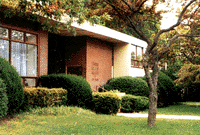 The Ethical Humanist Society of Long Island
The Ethical Humanist Society of Long Island
38 Old Country Rd
Garden City,
NY 11530
(516) 741-7304
Questions and Answers
Is It A Religion?
An Ethical society is religious in the sense that members are inspired with a vision of an ideal life in which the human personality is sacred. Each person is called upon to cultivate those qualities, which help bring about this better world.
An Ethical Society provides welcoming ceremonies for the newborn, weddings, and memorials and funerals. Its leaders perform the pastoral duties of spiritual leaders.
The central religious attitude is one of a sense of reverence, gratitude and respect. This is encouraged by understanding the individual as part of a larger whole - an active participant in the human and natural drama.
Religion can also be understood as a way of life in, which caring is central to one's being.
What Does It Believe?
Ethical Humanism believes in the dignity and worth of each person. Each person is unique and has an obligation to foster uniqueness in others.
Humankind is part of nature and by paying respect to all that surrounds us we create the sacred and holy. Therefore, the welfare of the human and natural community is understood as dependent upon responsible human effort.
Ethical Humanism has a faith in the improvability of the human condition through personal and community efforts. In this way, the good person is a person learning to become more sensitive to the joy and suffering of others.
Ethical Humanism believes that meaning and purpose are derived from acts of loving-kindness, and that comfort, solace and support are ultimately found here, on this earth, in community.
What Are Its Origins?
Confucius established a philosophy of life which placed ethical conduct as the core consideration for creating a good life.
Several schools of thought in ancient Greece created a philosophy based upon human concerns without supernatural beliefs.
By the 18th century, reform movements in Judaism and Christianity brought ethics to the forefront of religious thought and practice. In Germany in the 1840's several Protestant churches adopted a creedless, non-dogmatic religion based upon considerations of social justice.
The first Society for Ethical Culture was founded in 1876 by Felix Adler, a rabbi's son. Within a decade societies were established in Philadelphia, St. Louis and Chicago, all led by those with Christian backgrounds. Ethical Societies were established in many European countries before the end of the 19th century.
Ethical Societies in the United States are joined together in a federation called the American Ethical Union.
The AEU is a member of the International Humanist and Ethical Union. Founded in 1952, the IEHU is headquartered in The Netherlands.